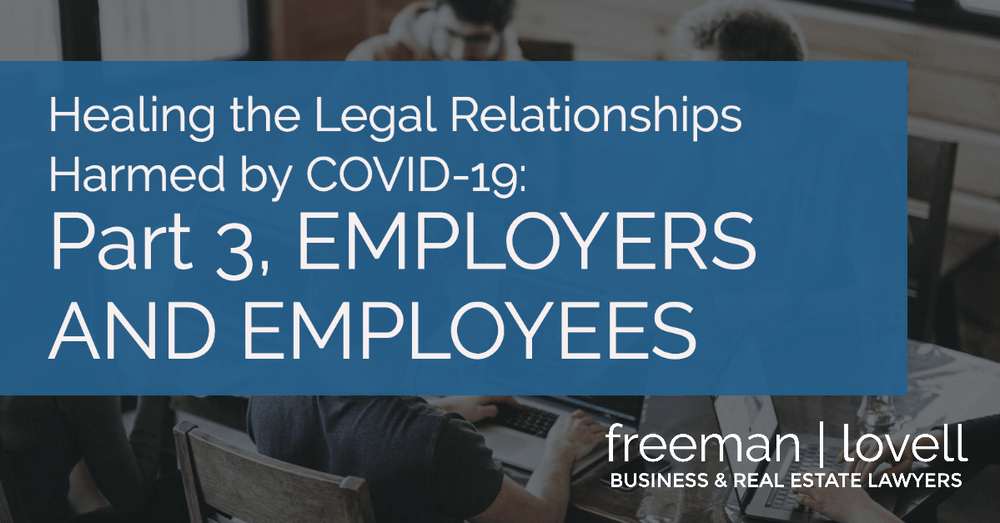April 24th, in a Freeman Lovell webinar, Josh Freeman and Michael Thomas discussed the impact of COVID-19 on legal relationships. This post is a supplement to that webinar. A recording of the webinar is embedded in the below post, or you can watch it HERE .

Written by Michael Thomas
This is Part 3, the final installment, of our commentary on Healing the Legal Relationships Harmed by COVID-19. As discussed in our Webinar on April 24, 2020, employers are facing unique challenges with a workforce that is sick, quarantined, social distancing, forced home with kids due to school and daycare closures, or—at the very least—concerned for their safety in the workplace.
New federal legislation addresses these needs in the Families First Coronavirus Response Act (the “FFCRA”). The FFCRA requires employers to provide leave for employees adversely impacted by illness, quarantine, or childcare needs. Employer obligations have been discussed in our prior blog post , and the Department of Labor has assembled a comprehensive Q&A with information and direction for employers and employees available , HERE . In our Webinar, we discussed some new developments with the FFCRA, including penalties and the small business exemption.
The penalties for noncompliance with the FFCRA will come in the form of (1) discrimination claims by impacted employees and (2) DOL enforcement. A violation of the FFCRA for failure to provide necessary leave is treated as a violation of the minimum wage laws, which carry a $1,000 per offense fine. Penalties are less severe if they are not found to be “willful,” so a demonstrated effort at compliance is an important first step.
Of course, you won’t face a penalty for noncompliance if you are exempt from FFCRA leave requirements, as is the case for vulnerable small business owners. The small business exemption, provided in the Federal Register, excuses you from providing paid leave if any of these three situations apply:
- Doing so "would result in the small business's expenses and financial obligations exceeding available business revenues and cause the small business to cease operating at a minimal capacity";
- The absence of the employee or employees seeking leave "would entail a substantial risk to the financial health or operational capabilities of the business because of their specialized skills, knowledge of the business, or responsibilities"; or
- "There are not sufficient workers who are able, willing, and qualified, and who will be available at the time and place needed, to perform the labor or services provided by the employee or employees requesting leave . . . and these labor or services are needed for the small business to operate at a minimal capacity."
It is critical that you document your analysis on this issue and hold onto the documentation for four years. The DOL is not likely in a position to do widespread enforcement right now on the massive scale that these issues apply. So, employers claiming the small business exemption are not expected (or even able) to submit any kind of request or approval for the exemption. Instead, you will be expected to show how you complied if you are ever audited or challenged in the future.
When employees do return to work, some reservations about safety in the workplace are to be expected. Employers should make every effort to comply with their industry’s developing safety standards. For example, the DOL has released a guidebook on Preparing Workplaces for COVID-19, available HERE . Employers can educate their workforce on safety and compliance issues. Where reasonable accommodations can be made—such as for those with particular infection risks—find a workable solution. And then uniformly enforce your policies and attendance requirements to avoid claims of discrimination.
Watch the recorded Webinar for further details on these important developments.




